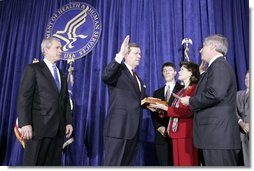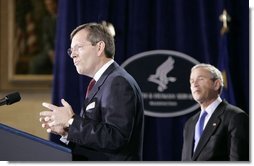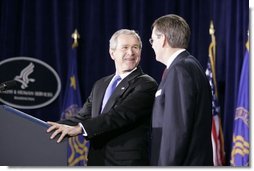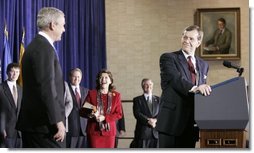
- Afghanistan
- Africa
- Budget Management
- Defense
- Economy
- Education
- Energy
- Environment
- Global Diplomacy
- Health Care
- Homeland Security
- Immigration
- International Trade
- Iraq
- Judicial Nominations
- Middle East
- National Security
- Veterans
|
Home >
News & Policies >
February 2005
|
For Immediate Release
Office of the Press Secretary
February 11, 2005
President Thanks HHS Secretary Leavitt at Swearing-In Ceremony
The Great Hall
U.S. Department of Health and Human Services
Washington, D.C.
10:45 A.M. EST
THE PRESIDENT: Good morning. I'm proud to visit this fine Department and to congratulate my friend, Michael Leavitt, on becoming America's 20th Secretary of Health and Human Services. Congratulations.
SECRETARY LEAVITT: Thank you, Mr. President. (Applause.)
THE PRESIDENT: I know this is a particularly special day for Mike -- after all, it's his 54th birthday. (Laughter and applause.) And it's always a special day for him when his family members are here. He loves his family. He's got a great wife, named Jackie; Westin is here representing his brothers and sisters; his dad's first name is Dixie -- kind of sounds like he should be from Texas. (Laughter.) Appreciate the other members of the Leavitt family who are here.
 I want to thank Senator Bob Bennett, from the great state of Utah,
for joining us, and Congressman Ralph Regula for being here -- I
appreciate you both coming. I want to thank other members of my
Cabinet and administration who have joined us. I particularly want to
thank the men and women of Health and Human Services for your hard
work, and remind you that you're serving during a critical time for
America's health and well being.
I want to thank Senator Bob Bennett, from the great state of Utah,
for joining us, and Congressman Ralph Regula for being here -- I
appreciate you both coming. I want to thank other members of my
Cabinet and administration who have joined us. I particularly want to
thank the men and women of Health and Human Services for your hard
work, and remind you that you're serving during a critical time for
America's health and well being.
Thanks to Secretary Tommy Thompson's superb leadership, HHS has helped our medical community prepare for a new era in public health. You've made groundbreaking progress toward new cures for disability and disease. You've led a bold initiative to win the global fight against HIV/AIDS. The good work of this Department is making America healthier and more hopeful, and I thank each of you for your commitment and your compassion. As Secretary Leavitt begins his service, HHS is embarking on a set of new challenges and historic opportunities. One of your most important responsibilities will be implementing the Medicare Modernization Act, which I signed some 14 months ago. This law is a landmark achievement in American health care, and millions of older Americans are already benefiting from its reforms.
Because we acted, Medicare now covers preventive medicine, including screenings for heart disease and diabetes, and a "Welcome to Medicare" physical. Instead of waiting to get sick or facing costly treatments, seniors can now identify problems early and manage them before they grow worse. By reducing major surgeries and longtime hospital stays, preventive medicine will save money, and, more importantly, it will extend the lives of our seniors.
Because we acted, Medicare will also cover prescription drugs. Under the old system, Medicare would pay $28,000 for ulcer surgery, but not the $500 a year for the prescription drugs that eliminated the cause of most ulcers. That system didn't make any sense. It made no sense for our seniors; it made no sense for American taxpayers.
 Because prescription drugs are expensive, many seniors face the
terrible choice between buying groceries and buying medicine. We left
those days behind with the Medicare Modernization Act. Low-income
seniors can get up to $600 to buy medicine this year. Next January,
every senior in Medicare will have the option of a prescription drug
benefit. And so that all seniors can get the care they need,
low-income seniors will get extra assistance and will pay a reduced
premium or no premiums at all on prescription drugs.
Because prescription drugs are expensive, many seniors face the
terrible choice between buying groceries and buying medicine. We left
those days behind with the Medicare Modernization Act. Low-income
seniors can get up to $600 to buy medicine this year. Next January,
every senior in Medicare will have the option of a prescription drug
benefit. And so that all seniors can get the care they need,
low-income seniors will get extra assistance and will pay a reduced
premium or no premiums at all on prescription drugs.
Because we acted, seniors in Medicare will have more control over their health care. Seniors will be able to choose a health plan that meets their needs and health plans will compete for their business, which will lower costs throughout the program. The system probably sounds familiar to some here -- (laughter) -- after all, it's what we offer federal employees. If choosing your health plan is good enough for the federal employees, it's good enough for America's seniors, as well.
Putting these reforms in action will be challenging. But with the leadership of Secretary Leavitt and Administrator McClellan, I know you're up to the task. We all know the alternative to reform: a Medicare system that offers outdated benefits and imposes needless costs. For decades we promised America's seniors that we can do better, and we finally did. Now we must keep our word. I signed Medicare reform proudly and any attempt to limit the choices of our seniors and to take away their prescription drug coverage under Medicare will meet my veto. (Applause.)
Secretary Leavitt will also lead important reform in the Medicaid program. He will work closely with the governors to make Medicaid more fair and more flexible. And together, we will take new steps to ensure that Medicaid fully serves our most vulnerable citizens, especially our children. Both Medicare and the State Children's Health Insurance Program -- it's what's called S-CHIP -- offer preventive care to low-income families at little or no cost. Yet, millions of eligible American children are not signed up. So I proposed a billion-dollar effort called, "Cover the Kids," to help state and community groups and faith-based charities enroll more children in Medicaid and S-Chip. We must not allow a lack of attention or a lack of information to stand between these children and the health care they need.
To reinforce America's health safety net we are also increasing support for community health centers. These compassionate facilities meet a critical need by providing primary care to the poor and the uninsured. They also take the pressure off of our emergency rooms and our hospitals. When I took office, I pledged to open or expand 1,200 community health centers by 2006. Thanks to the hard work of this Department, we've opened or expanded 619 centers so far, and we're on track to meet our objective by the end of next year. Now Secretary Leavitt and I are working toward a new goal: We will ensure that every poor county in America has a community health center. (Applause.)
 As we deliver quality health care to those in need, we must also
help more adults find private health insurance at their jobs. More
than half of all the uninsured Americans are small business employees
and their families. To help these people get good coverage, I have
asked Congress to allow small businesses to pool together to buy
insurance at the same discounts that big companies get. I've proposed
tax credits for small businesses and low-income workers that would
allow more people to open tax-free health savings accounts. To reduce
health care costs and prevent medical errors, we're working to expand
the use of information technology in health care. And to make health
care more affordable for every doctor, patient and entrepreneur,
Congress needs to pass medical liability reform this year. (Applause.)
As we deliver quality health care to those in need, we must also
help more adults find private health insurance at their jobs. More
than half of all the uninsured Americans are small business employees
and their families. To help these people get good coverage, I have
asked Congress to allow small businesses to pool together to buy
insurance at the same discounts that big companies get. I've proposed
tax credits for small businesses and low-income workers that would
allow more people to open tax-free health savings accounts. To reduce
health care costs and prevent medical errors, we're working to expand
the use of information technology in health care. And to make health
care more affordable for every doctor, patient and entrepreneur,
Congress needs to pass medical liability reform this year. (Applause.)
At HHS you bring the hope of better health to millions of your fellow citizens, and you do much more. HHS promotes adoption, and abstinence and pre-school education, and leads our efforts to stop drug abuse and domestic violence. Secretary Thompson has called this "America's Department of Compassion," and I know Secretary Leavitt sees it the same way.
Many of your greatest allies in the armies of compassion are found in faith-based and community groups. With Secretary Leavitt's leadership, we'll continue to support the hopeful works of these caring citizens. We'll also work with Congress to reauthorize welfare reforms that require work and strengthen marriage and promote responsible fatherhood. We'll continue the life-saving work of combating HIV/AIDS at home and abroad.
As you fulfill all these duties, HHS is also meeting the needs of a nation at war. Researchers at NIH and the Centers for Disease Control are on the front lines of defending America against the threat of bioterror. FDA inspectors are expanding efforts to secure the food supply and ensure the safety of medicine. We've completed the doubling of funding for medical research at NIH. Yet spending is not our only measure of success. When we commit taxpayer dollars, we will insist on results in return. And in every scientific pursuit, we will uphold the values of freedom, equality and human dignity. We must never sanction the creation of life, only to destroy it. (Applause.)
 With this new responsibility, HHS Secretary Leavitt continues a
distinguished career of public service. I've known him as a governor.
We're members of the ex-governor's club. (Laughter.) I've known him
as the administrator of the EPA. I've witnessed his integrity and
creativity and compassion. He has a proven ability to move beyond the
partisan debate, to work with leaders at all levels of government and
to improve the lives of the people he serves.
With this new responsibility, HHS Secretary Leavitt continues a
distinguished career of public service. I've known him as a governor.
We're members of the ex-governor's club. (Laughter.) I've known him
as the administrator of the EPA. I've witnessed his integrity and
creativity and compassion. He has a proven ability to move beyond the
partisan debate, to work with leaders at all levels of government and
to improve the lives of the people he serves.
That is what I've asked Mike to do as America's Secretary of Health and Human Services. With your help, I know he will succeed. Congratulations. (Applause.)
SECRETARY LEAVITT: Thank you, Mr. President. Mr. President, I approach this task with enormous optimism, and appreciation. I feel the gravity of the responsibility. But I feel your confidence. And I feel the fundamental privilege it is to serve the people of the United States of America.
I'd like to thank my family and so many friends who have traveled to Washington today for this ceremony. I also want to acknowledge a couple of members of my family who are not here -- my four children that aren't present with Jackie and my son Westin; our oldest son, Mike, and his wife, Carrie; Taylor and spouse Tammy; Anne Marie, our only daughter, and Hyrum, her husband; and our son Chase, who is doing missionary service for our church; and also my mother, who is off on a mission of her own today helping some grandchildren at a moment of need. (Laughter.)
I'd also like to thank a number of special guests that are here -- my colleagues on the Cabinet: Elaine Chao, Margaret Spellings, John Walters, Steve Johnson, the acting administrator of the EPA. I know so many of my friends from the White House, which I find gratifying that you would come. Secretary Card, thank you for administering the oath of office -- Heidi Smith, Jim Connaughton, John Walters, Terrel Halaska. I saw Doug Badger, Philo Hall, I think I notice Harriet Miers and Dan Bartlett and Dina Powell. All of them I deeply appreciate your coming.
I must also say Senator Bennett and Mr. Regula, how much I appreciate you're being here, two people I look forward to working with on so many of these issues.
And I've asked two of my colleagues from HHS to attend, representing my new colleagues here at this department -- Mirtha Beadle. Mirtha, I thank you. Mirtha is the acting Deputy Director of the office of -- a very important office here at this department, Minority Health. She's responsible for providing leadership on important issues like minority health and assuring that we do away with the health disparities that so often creep into our society. She's also known in this department for remarkable dedication.
I'd also like to introduce you to Daniel Baker. Daniel Baker began working in federal service in November of 1939. He has been working in federal service for 65 years. The only break he has had was to serve in World War II, to fight for this country. I met Mr. Baker, and it reminded me, Mr. President, of a conversation I had with a man about Mr. Baker's age, and I said to him, "So have you lived in this town your whole life?" And he said, "Not yet, I haven't." (Laughter.) I think the same could be said of Mr. Baker. He has made not just a career, but a life out of serving the disabled and the elderly in this country. And interestingly enough, he was part of the original work team that was established to create Medicare.
I also want to acknowledge -- (applause.) I also want to recognize Tommy Thompson, whose portrait will soon hang on this wall. He inspired this department. His four years at the helm made America a healthier and a safer place, and I will build on that legacy.
I want to make clear that I understand the very clear mission that the President of the United States has given me, and that is to help Americans live longer and healthier, and to do it in a way that protects our economic competitiveness as a nation.
Now, this is a new chapter for me in my public service. But, Mr. President, as I listened to you today articulate your agenda, it reminded me of an incident that I have recounted on other occasions as I began a new chapter, that I believe defines in many ways my own aspirations. When I was a boy I spent a lot of time on our farm. There was a farmer down the road from my grandfather who always had more land than he could afford and a brand-new John Deere tractor that I admired.
One day I said to him, "Grandpa, how can he do that?" My grandfather said, "Mike, if we'll stick with what's real and right, we'll be farming a long time after he's been repossessed." (Laughter.) And that's exactly what happened. A few years later the new tractor was gone, but we were still farming.
So as I heard you articulate your agenda today, I -- that story came back to me, because it's what's real and what's right. Responsibility to care for the truly needy is real. Fostering self-reliance as we do it is right. The enabling and ennobling virtue of work is real. The responsibility to remember that as we make national policy on human service programs is right. The responsibility to nurture children, to care for the elderly, to arm future generations with enduring values is real. Strengthening marriages and protecting families is right.
This commitment we have as a nation to provide health care for the disabled, for the elderly, for children and low-income families, that's very real. And as you said, fixing Medicaid is right. The opportunity to transform, to fundamentally transform our health care system is real. Putting health insurance, health records, health savings that we own into the reach of every American, that's right.
The need for fewer medical mistakes, for lower costs, for better health care fundamentally is real. A health system that revolves around consumers, and not the system, that's right.
NIH, in its opportunity to eliminate cancer, and diabetes, and the cause of human suffering and pain, with focused, real peer-reviewed science is, in fact, real. Transforming CDC to prevent diseases, rather than to simply treat them, is right. The threat of bioterrorism is real. Being vigilant and ready is right. The trust that this nation places in the Food and Drug Administration is real. Adopting a new and a more bold -- an emboldened vision for that agency for the 21st century is right.
Real and right, Mr. President, values that we should all be teaching our children, and it's the way I aspire to lead this department.
During the time that I served as governor I kept a treasures box -- just little things that I thought would mean a lot to me in the future. I've begun to sort through them on occasion, as I have time. And the other day I found a note that my mother had written to me just before I was sworn in as governor. I thought maybe I would read it to you today.
"Dear Michael: When you were a little boy, and television had just come to our town, the show you never missed was Gunsmoke. Strangely, the part you liked the most occurred before the episode began. It was the part where Matt Dillon rode his horse up onto a ridge, and paused, leaned forward onto the saddle horn and described the rigors of being a U.S. Marshall in Dodge City. Mr. Dillon would say, 'It's a chancy job, and a little lonely.' In perfect imitation, you used to gallop your stick-horse around the house, stopping at appropriate intervals to declare in your deepest four-year-old voice, 'It's a chancy job, and a little lonely.'" (Laughter.)
"Well," she continues, "Here you are again, son, a chancy job, this time for real. But I have a strong sense of security knowing that you understand so well that this job, as well as any other, even when you feel lonely, you really never need to be alone."
Well, Mr. President, it's occurred to me that Washington is a little like Dodge City. (Laughter and applause.) And I just want to assure you and the people of this country that I understand the principle well. I do not intend to approach this job alone. Not only will I depend on so many remarkable people, but I will acknowledge the blessings of God on this country, and I will seek his help.
Thank you. (Applause.)
END 11:07 A.M. EST


